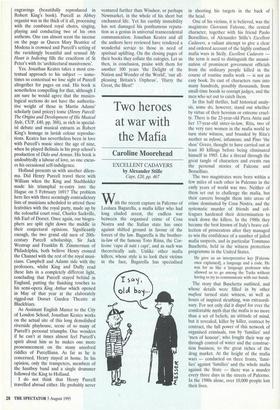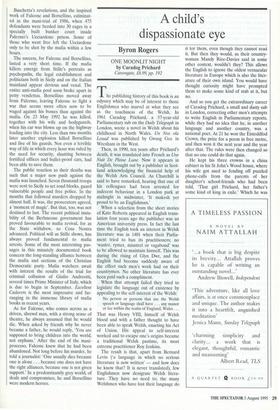Two heroes at war with the Mafia
Caroline Moorehead
EXCELLENT CADAVERS by Alexander Stille Cape, £20, pp. 467
With the recent capture in Palermo of Leoluca Bagarella, a mafia killer who had long eluded arrest, the endless war between the organised crime of Cosa Nostra and the Italian state has once against shifted ground in favour of the forces of the law. Bagarella is the brother- in-law of the famous Toto Riina, the Cor- leone 'cap° di tutti i cape, and as such was theoretically safe. Unlike other mafia killers, whose style is to look their victims in the face, Bagarella has specialised in shooting his targets in the back of the head.
One of his victims, it is believed, was the magistrate Giovanni Falcone, the central character, together with his friend Paolo Borsellino, of Alexander Stille's Excellent Cadavers, a valiant attempt to give a clear and ordered account of the highly confused mafia wars in Sicily. Excellent Cadavers — the term is used to distinguish the assassi- nation of prominent government officials from the ordinary people killed in the course of routine mafia work — is not an easy book. Its cast of characters runs into many hundreds, possibly thousands, from small-time hoods to corrupt judges, and the men who set out to catch them.
In this half thriller, half historical analy- sis, some do, however, stand out whether by virtue of their heroism or extreme cruel- ty. There is the 23-year-old Piera Atria and her 17-year-old sister-in-law, Rita, two of the very rare women in the mafia world to turn state witness, and branded by Rita's mother as infami, infamous; and Pino 'the shoe' Greco, thought to have carried out at least 80 killings before being eliminated himself in 1985. Like a thread through the great tangle of characters and events run the personal stories of Falcone and Borsellino.
The two magistrates were born within a few miles of each other in Palermo in the early years of world war two. Neither of them set out to challenge the mafia, but their careers brought them into areas of crime dominated by Cosa Nostra, and the systematic murder of friends and col- leagues hardened their determination to track down the killers. In the 1980s they became the best known of Italy's brave col- lection of prosecutors after they managed to win the confidence of a number of jailed mafia suspects, and in particular Tommaso Buschetta, held in the witness protection programme in the United States.
He gave us an interpretative key [Falcone once explained], a language and a code. He was for us like a language professor who allowed us to go among the Turks without having to try to communicate with our hands.
The story that Buschetta outlined, and whose details were filled in by other mafiosi turned state witness, as well as hours of inspired sleuthing, was extraordi- nary. For not only did it dispel for ever the comfortable myth that the mafia is no more than a set of beliefs, an attitude of mind, but it revealed, killer by killer, contract by contract, the full power of this network of organised criminals, run by 'families' and 'men of honour', who fought their way up through control of water and the construc- tion business, to the great riches of the drug market. At the height of the mafia wars — conducted on three fronts, 'fami- lies' against 'families' and the whole mafia against the State — there was a murder every three days in the streets of Palermo. In the 1980s alone, over 10,000 people lost their lives. Buschetta's revelations, and the inspired work of Falcone and Borsellino, culminat- ed in the maxi-trial of 1986, when 475 defendants were herded into 30 cages in a specially built bunker court inside Palermo's Ucciardone prison. Some of those who went free left the Ucciardone only to be shot by the mafia within a few hours.
The success, for Falcone and Borsellino, lasted a very short time. If the mafia killers emerge from Stille's portraits as psychopaths, the legal establishment and politicians both in Sicily and on the Italian mainland appear devious and venal. The entire anti-mafia pool soon broke apart in petty vendettas. Borsellino moved away from Palermo, leaving Falcone to fight a war that seems more often now to be waged against his bosses than against the mafia. On 23 May 1992 he was killed, together with his wife and bodyguards, when his car was blown up on the highway leading into the city. Less than two months later another explosion killed Borsellino and five of his guards. Not even a terrible way of life in which every hour was ruled by the need for security, shunting between fortified offices and bullet-proof cars, had been able to save them.
The public reaction to their deaths was such that a major new push against the mafia was launched. Seven thousand troops were sent to Sicily to set road blocks, guard vulnerable people and free police. In the months that followed murders dropped by almost half. It was, the prosecutors agreed, a 'moment of magic'. But that, too, was not destined to last. The recent political insta- bility of the Berluscone government has proved favourable to mafia revival, for as the State withdrew, so Cosa Nostra advanced. Political will as Stille shows, has always proved fundamental to mafia arrests. Some of the most interesting pas- sages in this minutely documented book concern the long-standing alliance between the mafia and sections of the Christian Democratic party. Mafia watchers await with interest the results of the trial for criminal collusion of Giulio Andreotti, several times Prime Minister of Italy, which is due to begin in September. Excellent Cadavers is the most impressive and far- ranging in the immense library of mafia books in recent years.
As for Falcone, who comes across as a driven, shrewd man, with a strong sense of theatre, he always assumed that he would die. When asked by friends why he never became a father, he would reply, 'You are supposed to bring children into the world, not orphans.' After the end of the maxi- process°, Falcone knew that he had been abandoned. Not long before his murder, he told a journalist: 'One usually dies because one is alone. . . because one does not have the right alliances, because one is not given support.' In a predominantly grey world, of deals and compromises, he and Borsellino were modern heroes.



















































 Previous page
Previous page